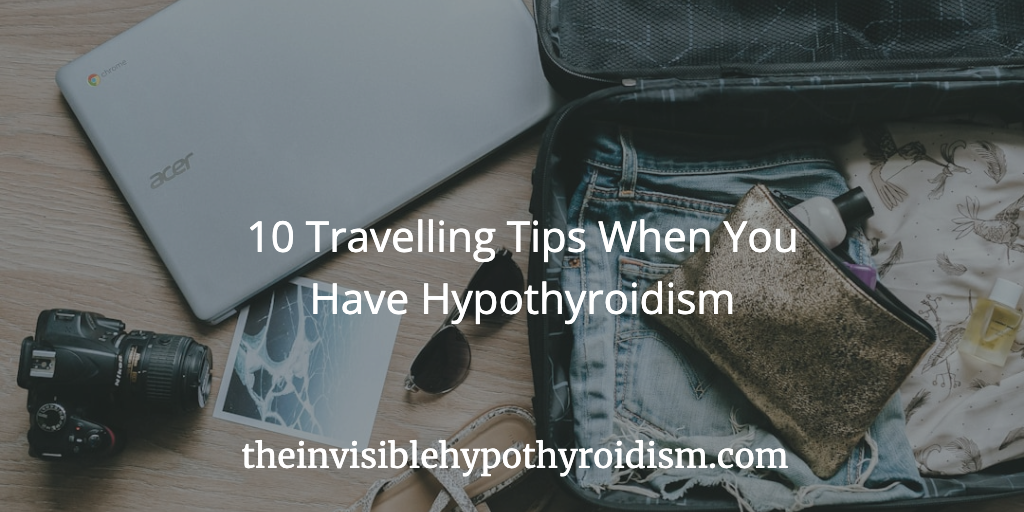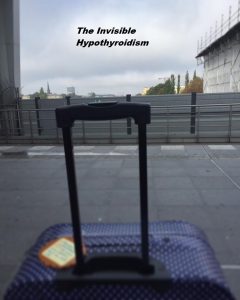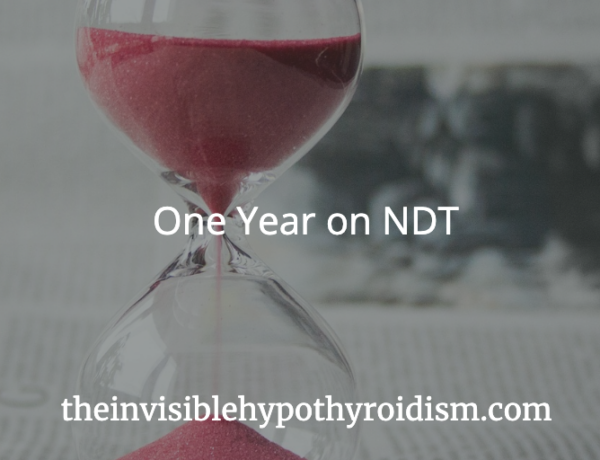Originally published on 10th October 2016 Last updated on 24th June 2024
Travelling with a health condition can feel daunting, especially if you also have specific dietary requirements or your medication is complicated.
So I’m sharing some tips I’ve learned since having hypothyroidism and Hashimoto’s and travelling around the world.
Also see my related post: Things to Pack for a Holiday With Thyroid Disease
1. Consider Your Medication
Take your thyroid medication in your hand luggage so it’s with you at all times and there’s no chance of it going missing. This also means that should security pick it up and want to inspect it further, they can do so much more easily and without disturbing all the other stuff in your hold suitcase, and you can explain simply what it is. Carry it with it’s original packaging and leaflet if you can.
I personally like to carry my thyroid medication in both my hand and hold luggage, in case either one goes missing or if it gets confiscated for any reason, even though confiscation isn’t very likely and has never happened to me. I am overly-cautious, as I’m on NDT, a less conventional thyroid medication, and I have also lost luggage before.
I take the amount I need for the duration of my trip in a pill organiser in my hand luggage, and then the exact same amount again but in the original packaging in my hold case.
I’ve never been stopped for my thyroid meds either in my hold or hand luggage. If I was stopped, I would simply explain that it is medication for my hypothyroidism and my doctor prescribes this, who they can call if they want to. I also have my doctor write a letter explaining my medication situation and carry it with me in my hand luggage, just in case anyone was to question it. I’ve covered how you can obtain one of these letters here.
Parts of the world I have been more cautious about include North Africa and Islamic countries, where pork products are technically prohibited, as my thyroid medication is made from porcine gland. However, I was not stopped or questioned for my medication on any of these trips.
You may also need to take in to consideration any timezone differences, when it comes to taking your medication. If possible, try to stick to your usual schedule, as your body will be used to this, but talk to your doctor if you’re unsure.
2. Pick The Right Hotel
Choosing an appropriate hotel is an important part of my trips away. To help me cope with all the walking I do when sightseeing, I try to book a room with a bath so I can soak my legs at the end of the day and recharge. I preempt that I’ll need some recharging time.
I also aim for a room on the ground floor if possible or by the lift so there’s minimal walking or climbing of stairs, which also helps to conserve more energy. But this hasn’t always been possible, either. It’s just a preference.
A hotel that is central to the main areas I’ll be exploring or at least within reach of good transport links, is also essential to help preserve my energy.
Related post: The ‘Spoon Theory’ Perfectly Captures Managing Thyroid Fatigue
I always check out the reviews of any potential hotels and make sure there are none complaining of lumpy beds or too much noise. If I have a less than decent night’s sleep, I can feel really rough and flarey the next day. A good nights sleep is crucial for me to function and enjoy the trip.
3. Plan Ahead For Food
If you’re one of the many thyroid patients who follow dietary adjustments such as gluten-free, dairy-free etc. to help manage your symptoms and thyroid condition, then going somewhere unfamiliar can be daunting if you’re unsure of what you’ll be able to eat.
When going to Berlin, Frankfurt and Venice, I was concerned that a lot of their typical cuisine involved bread, sausages and pasta – all things that tend to contain gluten. And I don’t eat gluten due to having Hashimoto’s.
I found that the best way to manage this was to pack some gluten-free staples in my hold and hand luggage, such as snacks and breakfast, so as not to rely on it always being easy to find once there and minimise my anxiety of the issue.
Using TripAdvisor to search for places that catered to gluten-free diets is also very helpful and saves time walking around and checking the menu of every place until we find somewhere suitable. We also read reviews on gluten-free options and see what other people are saying.
I also have an app called ‘GF Card’ which explains in multiple languages that I cannot have gluten, wheat, oats, barley, rye or malt etc. which is very useful if you’re concerned that the waiter doesn’t fully understand what you mean. You just show it on your phone screen in their language and it has you covered.
You should also make sure that you’re eating regularly and getting lots of protein and healthy fat to keep your energy levels up and blood sugar balanced, when out and about. Don’t be tempted to leave going out for dinner too late in the evening or have too long a lie-in and miss breakfast. You’ll feel sick, wobbly and tired if you don’t eat at regular intervals, especially when you’re using so much energy moving around on holiday, so you’ll need to be replacing this!
I usually pack olives, nuts, seeds, cheese, protein bars and more, focusing on a ratio of 1:2 with Protein:Carbs. I limit sugar.
Start your day right and you’ll feel the benefits all day long.
In the past, I’ve gone for an apartment type hotel where a small kitchen is included, so I can prepare my own breakfast whenever I want. Going in to a shop when I first arrive to buy some eggs, natural yoghurt, fruit, honey etc. is quite easy and makes preparing a gluten-free breakfast stress-free whilst away from home.
4. Stay Hydrated
I take my BPA and BPS-free water bottle with me on every journey and ensure I’m sipping water regularly and throughout the day. BPA and BPS-free water bottles are recommended as they don’t impact your hormones and are safer for consistent use.
If you notice that alcohol, sugary drinks etc. make you feel worse, then you may avoid these. I tend to and it significantly reduces my chances of low blood sugar moments, headaches, migraines or feeling low on energy.
5. Never Pass Up On a Seat!
When you’re out and about exploring, never pass up on the opportunity to take a seat. Simple but effective!
If there’s somewhere to sit or perch yourself when you’re not on the move, take it and preserve some more of that precious energy. Try to sit down fairly often anyway, even for just five minutes every hour, which can help you maintain decent energy levels for longer.
6. Dress Correctly
Making sure you pack clothes that are warm enough or allow you to be cool enough will help you in managing your hypothyroidism whilst on holiday. Being too cold can make your symptoms worse and being too hot can be an issue too.
Wear the right shoes as well. Make sure they’re comfortable and well-made for walking. If you’re planning hiking, cycling or other physical activity, take the right supportive footwear and clothes. Leave the cheaply made shoes at home and support your feet on your travels (after all, they support the rest of your body!)
7. Nominate an Emergency Contact
Nominate one person on your trip (if you’re travelling with someone else), as well as someone back home, who knows your medications, dosage, schedule etc. as well as travel insurance information and documentation. Should an issue arise with your health whilst abroad, it’s handy to have others you can count on or contact for help.
8. Get The Right Insurance
If you’re self-medicating or self-source your thyroid medication (which I know many of you are), such as T3 or NDT medications, then make sure that your insurance covers this.
Many providers state that people using a medicine not prescribed by a doctor invalidates their insurance, whereas other providers can be more blurry and state that if you do anything a doctor doesn’t recommend, i.e. self-medicating or self-sourcing, then it can also invalidate insurance.
Speak to someone at the insurance company and make sure your travel insurance covers you if you have a more complicated case like this. Explain every aspect of your health to them.
Bear in mind that even if your doctor supports you self-sourcing and self-medicating thyroid medication, a doctor the insurance provider uses may not. Make sure they explicitly cover your personal situation and get this in writing if at all possible. You can’t be too safe.
Also, when applying for travel insurance, make sure to state all and any health conditions you have and answer each question completely true to your knowledge and honestly. Many thyroid patients have other health conditions that also need to be stated.
9. Prepare For Other Illness to Strike
No one likes to think about getting ill on holiday, but coming down with a stomach bug, diarrhoea, headache, a cold or sore throat can happen. Make sure you pack a suitable ‘medical kit’ consisting of allergy tablets, pain killers, re-hydration sachets, diarrhoea tablets, cough lozenges etc. just in case.
I often pick up a bug, cold or virus from someone on the plane who doesn’t cover their mouth when coughing and it’s really frustrating to come down sick on vacation.
Related post: Are Thyroid Patients More Prone to Getting Sick?
10. Consider Your Supplements
You can help to support your immune system with supplements whilst your body is under extra stress from travelling.
I’ve covered a full list of the common ones taken by those with hypothyroidism here, but in short, some extra Vitamin C and zinc are good for supporting your immune system, whilst magnesium, B vitamins, selenium, Vitamin D etc. promote good energy levels, which can become depleted when travelling.
I’ve popped links to popular ones below:
Solgar 500 mcg Vitamin B12 Vegetable Capsules – 50 Capsules.
Solgar Vitamin C 1000 100 Vegetable Capsules.
Solgar, Natural Vitamin D3, 1000 IU, 180 Tablets.
Solgar 50 mg Zinc Tablets – Pack of 100
If I don’t stick to regularly taking my supplements when on holiday, I always come down with something, so I believe strongly in supporting my immune system with them.
However, always run any new supplements by your doctor or pharmacist before starting them.
11. Manage Your Expectations
To effectively manage my health on holiday, there have been times when I have had to catch up on sleep instead of going out.
Some mornings, I have also slept in and instead of going for breakfast provided by the hotel early in the morning, had a slightly later breakfast in the hotel room with the food I brought with me.
Knowing when to slow down and take it easy is crucial in managing your health conditions and energy levels on holiday. There’s no shame in getting an early night or not pushing yourself to do more than you should, just because ‘you’re on holiday and should be making the most of it’.
If you need to head back early or squeeze in a nap, and have the ability to do it, then do it.
I hope these tips help!
What tips would you add? Comment below!

The book Be Your Own Thyroid Advocate: When You’re Sick and Tired of Being Sick and Tired, which helps you to advocate for your own thyroid health.







